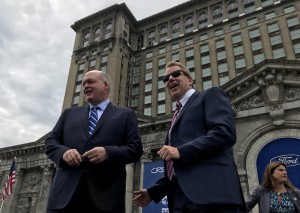
Jim Hackett, Ford president and CEO, said the company is moving to invest in areas that will return the best profits.
Ford’s second-quarter earnings were down compared with year-ago results, driven there by poor sales in China and the loss of truck sales when its supplier suffered a fire that forced the company to shut down its truck production lines for eight days.
The automaker reported net income of $1.1 billion, or 27 cents a share, on revenue of $38.9 billion, compared with 2017 results of net income of $2.1 billion, or 51 cents a share, on revenue of $39.9 billion.
“This quarter we achieved solid results in North America, offset in part by unexpected challenges with our overseas operations and headwinds in the business environment,” said Jim Hackett, president and CEO, in a statement.
Through the first half, the company is outpacing the first six months of last year in terms of revenue, but is behind on the bottom line at $2.8 billion in net income compared with $3.6 billion through June 2017. Again, that’s tied to aforementioned problems. Still the company is looking to be aggressive moving forward.
(FCA reports lower than expected earnings while mourning loss of Marchionne. Click Here for more.)
The problems with China, where Ford has seen sales fall every month of 2018, and the Asia Pacific region are a drain on the company’s bottom line. Because of the region’s poor performance, Ford is issuing new guidance for 2018.
Ford is now lowering the range for full year 2018 adjusted earnings per share guidance, now guiding to an adjusted EPS of $1.30 – $1.50. The automaker has characterized the problems in China, specifically, as a lack of sales due to a lack of new product as well as cost issues.
Improving cost competitiveness is being tackled with “aggressive fitness actions, localizing more product in China, as well as recruiting more local talent to key management positions.” The new product issue is a simple fix: 60% of the line-up being refreshed or new by the end of 2019. The issues outside of the U.S. aren’t limited the company’s efforts to shore up weak areas and grow new businesses.
“Despite this, our fitness actions continue to take hold and we’re clearly committed to redesigning and restructuring the underperforming parts of our business.”
(Click Here for details about GM reporting flat earnings.)
Ford is redesigning business models by moving its money to segments with bigger returns on those investments. New this quarter, the company announced that these activities could have potential EBIT charges of $11 billion, with cash-related effects of $7 billion, during the next three to five years, Ford officials noted.

Less than a month after Ford CEO Jim Hackett, left, and Bill Ford, announced plans for a Detroit campus, Hackett unveiled Ford Autonomous Vehicles L.L.C.
“The team is making the hard decisions to raise the returns of underperforming assets where we can via fitness and alternative business models, and we will disposition the rest,” said Bob Shanks, executive vice president and CFO, in a statement.
“This type of profound redesign will take time, and we will communicate as decisions are made, such as exiting traditional sedan silhouettes in North America.”
Not surprisingly, Ford’s North America business remains strong, with F-Series sales topping 236,000 units in the second quarter and on a record-setting pace through the first six months of the year. The company’s recent success has been buoyed its North American auto sales.
The company’s look at the future became for than a dream, when it put $4 billion toward the creation of Ford Autonomous Vehicles LLC which will include Ford’s self-driving systems integration, autonomous vehicle research and advanced engineering, AV transportation-as-a-service network development, user experience, business strategy and business development teams.
(To see more about Ford Autonomous Vehicles L.L.C., Click Here.)
The company’s captive finance arm, Ford Credit posted positive results with global receivables growth and favorable lease residual performance. The unit reported net income of $479 million on revenue of $1.4 billion in Q2, an increase of $33 million compared with the same period in 2017.

